
FRIDAY, JUNE 13 Ohr Shalom Zamru Shabbat
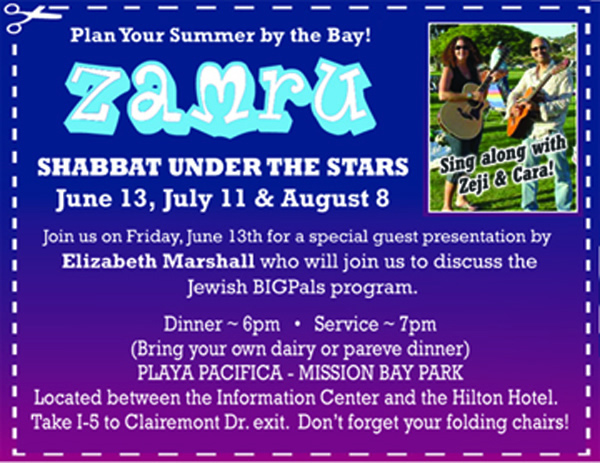

Friday, June 13 Congregation Beth El Kabbalat Shabbat Services


FRIDAY, JUNE 20 Temple Solel Freilich Friday
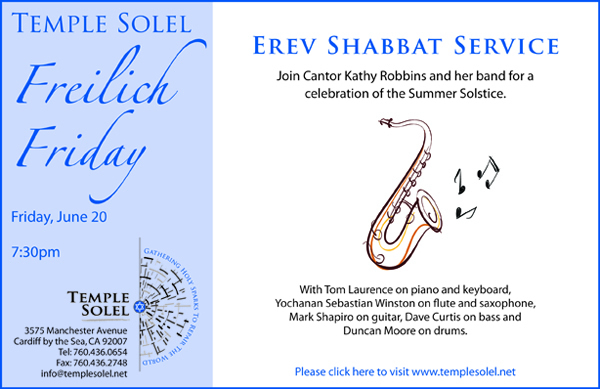

San Diego Jewish World seeking to expand its staff locally and globally
By Donald H. Harrison
 SAN DIEGO—Many of the bylines that you read on stories from San Diego County, elsewhere in the United States, or from around the world are those of volunteers who feel a kinship to their fellow Jews no matter where they live. What they have in common is an intense desire to share with their fellow Jews news, features and commentaries of Jewish-community interest. SAN DIEGO—Many of the bylines that you read on stories from San Diego County, elsewhere in the United States, or from around the world are those of volunteers who feel a kinship to their fellow Jews no matter where they live. What they have in common is an intense desire to share with their fellow Jews news, features and commentaries of Jewish-community interest.
Whether you live in San Diego County, the home base of San Diego Jewish World, or anywhere else in the world, we would welcome your participation in our global Jewish conversation.
In San Diego, we are looking for volunteer writers, reporters, photographers, web editors, researchers, and typists, and around the world we are seeking volunteer correspondents who would be interested in keeping their fellow Jews up-to-date on Jewish happenings in their communities.
By joining the staff of San Diego Jewish World, you become part of a growing network of friends who—though their opinions on any number of topics may vary— identify and care about the well-being of the Jewish community.
To inquire about participating on our volunteer, daily-web publication, please contact me, Donald H. Harrison, at editor@sandiegojewishworld.com or telephone him in San Diego at (619) 265-0808. We would be delighted to receive from you writing samples and a short resume of your interests. You do not have to be a trained journalist to participate; in fact, some of our most dedicated writers have joined us following their retirements in other fields.
Once you join San Diego Jewish World, you will experience the joy of knowing that you are adding to the knowledge of the Jewish community the world over!
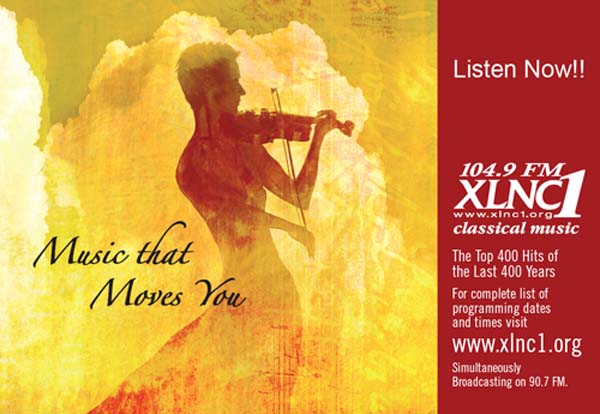

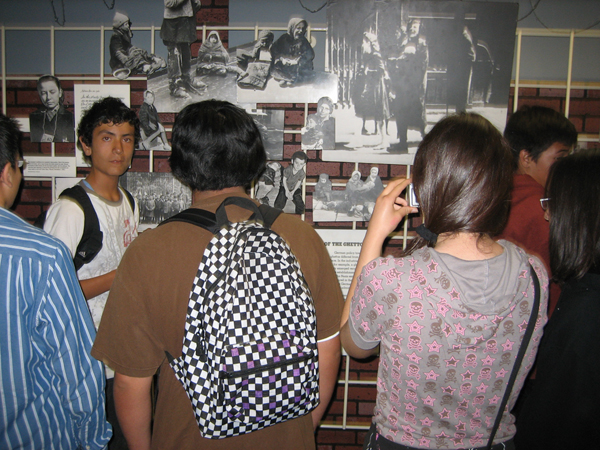
Latino, African-American students learn about Holocaust at new L.A. museum
By Michael Brau
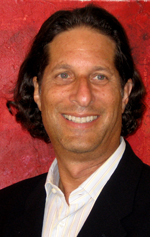 LOS ANGELES—I was quite interested when Linda Feldman, the director of the San Diego chapter of the American Jewish Committee (AJC), contacted me about the 9th grade teacher at Chula Vista High School, who wanted to take his students on a field trip to the Holocaust Museum in Los Angeles. The teacher, Greg Gutierrez, was inquiring about raising funds to pay for the two busses he needed to take his students to L.A. LOS ANGELES—I was quite interested when Linda Feldman, the director of the San Diego chapter of the American Jewish Committee (AJC), contacted me about the 9th grade teacher at Chula Vista High School, who wanted to take his students on a field trip to the Holocaust Museum in Los Angeles. The teacher, Greg Gutierrez, was inquiring about raising funds to pay for the two busses he needed to take his students to L.A.
As a result of the severe budget shortfall in Sacramento, all public schools in California have had to cut back or even end the funding of field trips that in the past have been so impactful on the students. Gutierrez was taking the initiative to see if he could source the funds he needed from Jewish organization and agencies, hoping they would have some interest in educating his unique group of students about the Shoah.
I briefly visited Guitterez in his classroom at Chula Vista High. He explained to me that most of his students have no knowledge about the Jewish experience. The majority of the students were of Hispanic background, with a large proportion of African-Americans in the class, too. These teens spent most of their lives locally, and had minimum exposure to things outside their homes. Many he said, had not even been north of Oceanside.
Feldman was successful in receiving a generous grant from the American Jewish Committee, My wife Rachel and I made up the balance, and so on a dreary weekday morning, I met Guitterez and his class to take the 3-hour bus ride to the Los Angeles Museum of the Holocaust. His well-behaved students watched two videos as we headed north.
The Los Angeles Museum of the Holocaust is located on Wilshire Boulevard, next to the offices of the Jewish Federation of Greater Los Angeles, on the ground floor of ORT’s L.A. offices. It is a rather small, unassuming museum with just a few rooms filled with photos of Shoah-related events including the Warsaw ghetto, Judaica, a Torah, and a diorama of Auschwitz. Frankly, the museum doesn’t have the emotional impact of other similar museums. (The museum broke ground this year for a permanent museum and martyr’s memorial in Pan Pacific Park.)
The time in the museum began with what was to be the highlight of the visit, a brief talk from a survivor, Henya Spitzberg. This lovely and exuberant woman quickly got the attention of the seated students who filled the room. There was an interpreter in the front of the room who was signing for the small group of hearing-impaired CVHS students who were with us.
In perfect accented English, Spitzberg told her story of being rushed from her family’s beautiful home in Hungary at age five. “Schnell! Schnell!,” she recalled the authorities screaming. Hurry! Hurry!. “We had only moments to gather a small valise of items before we were marched through the streets. I followed my mother and father, and three older brothers into a crowded cattle car,” she began.
The students were enthralled as Spitzberg chronicled her year in a work camp, and how she and her family survived the Shoah. Like so many other survivors,. Spitzberg was impacted by a moment of cooperation from a guard who allowed her mother to get water for her and her family just before the start of the trip. The students asked her a number of questions about that guard and why she thought the guard allowed her mother to get water. “How did she endure?” they wanted to know. “Why was she so fortunate? How did this all happen?”
Spitzberg described seeing African-Americans the first time when she was liberated. “That was the first time I saw a black person,” she said. “They were the first Americans I saw when we were liberated.” Ms. Spitzberg, a former teacher herself, was filled with such love and generosity of spirit, and the students recognized this part of her.
We broke into three groups after the end of the talk. The museum had three distinct displays, life in the ghetto before and leading to the Holocaust; the death and work camps; and survival after the war. I joined a group of the students who were viewing the photos of Jews living in ghettos, and reading about their lives.
I have found that so many of us don’t realize the kinds of lives the Jews in Europe had before the Holocaust. Many of us understand what happened during the Shoah, but don’t realize what was lost. “So many Jews in Europe had extraordinary lives,” I explained to the students. “They lived in beautiful homes filled with books, art, and recorded music. They were sophisticated; went to performances of music and theatre, and to restaurants. They attended excellent schools and universities. They had access to modern medical care. Though it was almost 70 years ago, and though there was none of the technology we now use every day, their quality of life was still excellent.” I wanted the kids to understand that it wasn’t like the Holocaust happened during the Dark Ages.
“What about Hitler?” one of them asked. “How come there is no mention of Hitler here?”
“This is a memorial to the victims and survivors of the Holocaust,” I explained. “Of course Hitler and Evil were among the causes of the Holocaust, but so was Indifference, Ignorance, and Racism.” I read them the tragedy of the S.S. St. Louis whose passengers were forced to return to Europe after being refused entry in Cuba and the U.S.
This group of students had little or no experience with Jews or Judaism. They had a lot of questions. The Museum has a badly damaged Torah that survived Nazi abuse on display. “What is this?” they asked. I explained to them that this was the Five Books of Moses and that these books were included in what they call “The Old Testament.” I told them that the Jewish and Christian, and even God of Islam, was the same God of Abraham, Isaac, and Jacob; that we all observed similar versions of the Ten Commandments. I informed them about our observing the Sabbath (Shabbat) on Friday evenings and Saturday; about Bar and Bat Mitzvahs, our major holidays and celebrations. They were disappointed when I told them we don’t celebrate Christmas. “But we have eight days of Chanukah,” I explained.
I continued to take and answer questions on the ride back to Chula Vista. “What about Israel? What about homosexuality? “ Their questions were on a wide range of issues, and I did my best to answer them.
I had two reasons that I wanted to support this trip and felt it was important. First, I realize that education is critically important to improving the lives of everyone. It cannot be overstated how urgent it is to make sure our youth receive the best education available. Our underfunded schools don’t have the resources to send kids to museums, parks, theatre, which can have extraordinary impact on the students. Teens from communities and families of few resources, are the ones who will especially benefit from an excellent public education.
Second, as the demographics change here in California, as well as the U.S., it is imperative that our Jewish values, history, and experience are understood and appreciated by everyone, especially young people who have little exposure to Jews. As America’s population changes and becomes more diverse, all Americans need to understand why Israel is so vital to us Jewish Americans; why the First Amendment, the separation between church and state, and prayer in the schools are important issues to us; and why Jews typically are involved in matters related to human rights and civil liberties.
As Jews, we should do everything possible to support the learning about our story, as well as the history of all of the diverse cultures in our Nation.
Editor's Note: The field trip prompted letters from some members of the high school class. They follow:
Dear Mr. Brau,
Thank you for the knowledge and information you gave us yesterday. Never had I known hat the survivors could go through so much in their time of despair and helplessness. Though you didn’t experience it (Holocaust) yourself, you still feel the pain of your brethren dying.
To see a survivor of these terrible times was touching for all of us. The hearts and souls of even the toughest members of our class melted at the tale of this 5-year-old girl experiencing such horror as never seen before.
Sadly, few Jews survived the Holocaust to tell their story…You speak for your people, and your people speak for you. I applaud your efforts at making this world a better place.
Your friend,
Karlo G.
Dear Michael Brau,
…If it wasn’t for you and he American Jewish Committee we probably wouldn’t never gone on the field trip and learn a lot about the Holocaust and heard that amazing story about Henya Spitzberg. She almost made me cry, because of how sad it was…Your story taught us something about Jews, and even our own religion. The museum was amazing…so thank you very much for this great experience.
Sincerely,
Jessica V.
Dear Michael Brau,
There are something’s in life you would regret, and can’t take back. This was one of them. I
thought at the time that Black’s were the only ones who were done wrong and tortured. (The trip) really
opened my eyes. …
You see people doing wrong, and it makes you want to do right…If it wasn’t for people like you doing good things for others some lives will be misguided. So I say to you from what you did it changed my life a lot more.
Thank you
Sharon Y.
Dear Mr. Brau,
….It was probably the best field trip I have ever been on. Honestly, I thought the Holocaust was a bunch of nonsense but after the field trip I have changed. Also I appreciate life more and my family even more.
To see all the struggles they had to go through. I mean I thought that I had a bad life but these guys had it horrible. The pain they went through was indescribable and I couldn’t believe what I was seeing.
The most tense and sad part…were the names of the kids on the plaques (honoring the victims). The one that stood out was a plaque that had a kid who was born in November 1943 and died in November 1943, and I’ll never forget that and the Holocaust.
Sincerely,
Andrew R.
Dear Mr. Brau,
I want to thank you and the American Jewish Committee for assisting our class. I know this experience has changed my way of thinking. I learned a lot about the daily lives of the Jewish people that were affected by the Holocaust. This has changed me because I know what these poor people went through. …You shared with us your thoughts about conflicts and racism, and we shared our personal experiences with you. I especially appreciated your interest in our own culture and the differences between mine and other cultures.
Sincerely,
Callista C.
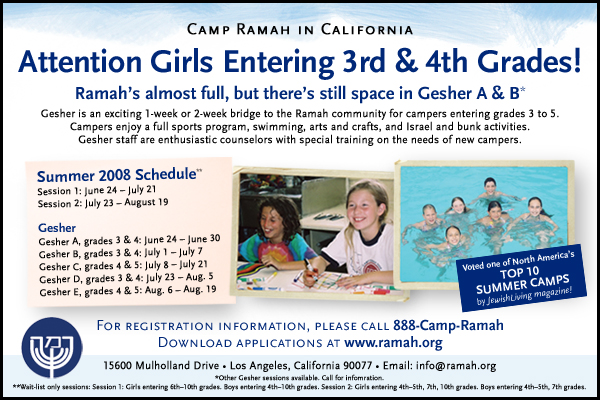


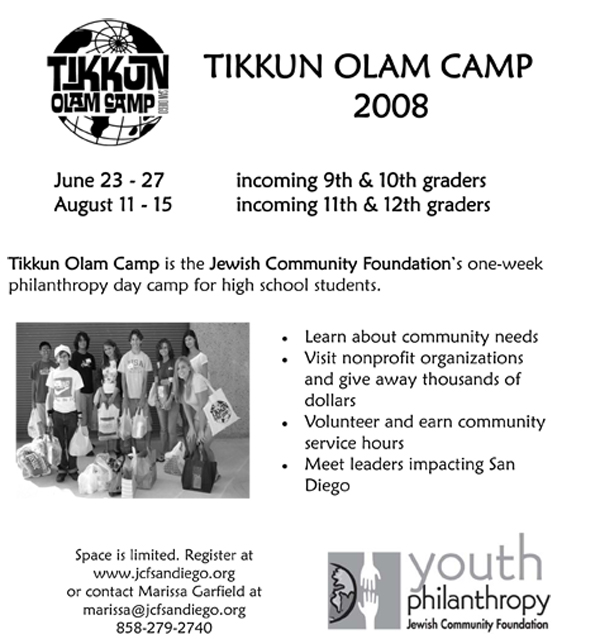

SDJA STUDENT QUARTERLY
{Editor's Note: The following stories appeared in the June issue of the SDJA Student Quarterly, a publication of San Diego Jewish Academy. Donald H. Harrison, editor of San Diego Jewish World, serves as advisor to the student newspaper.}
3 Generations later, Yeah, Yeah, Yeah
By Harry Doshay
The mop-topped legends of the sixties obviously retain an immense following among the generation who grew up when Hard Day’s Night was in theatres but among younger generations there seems to be a distinct split in enjoyment of the Beatles. This split is between those who enjoy music for its musical qualities, and those who enjoy music because it is “cool.” I obviously fall into the former.
Without a doubt, their catchy simple melodies have entranced America since the Beatles first aired on the Ed Sullivan show on February 7, 1964. Their simply poppy harmonies that first captured America’s ear are still potent today. From “I Wanna Hold Your Hand” to “Help!,” early Beatles music provides an almost unrivaled look at the glory of 60s pop. Although such early tunes may not have displayed the musical talent of other bands of their time, their simplicity was their greatest strength. Paul with his incredible grasp of melody, on both bass and vocals; George with his crazy sitar and skill at guitar, and John with his crazy in your face feelings form the glorious triumvirate of The Beatles. Plus Ringo.
As the Beatles progressed, so too did the complexity of their music. Their later albums are full of experimentations with sound that, although they had been done by unpopular bands, had never really entered the public consciousness. Some of these experiments were smash hits and inspired countless other albums (Sgt. Pepper’s Lonely Hearts Club Band), while some didn’t “Revolution 9”).
Later albums combined musical skill with an excellent grasp of pop songwriting. Side two of Abbey Road in particular was a beautiful melding of intriguing musical concepts and stunning melodies that all meshed together as one 20 minute movement
There are contemporaries of mine who scoff at the harmonious works of the Beatles. Their criterion is essentially that it is “old” or “old person music.” A fellow sophomore remarked that he disliked the Beatles because he had “heard it too many times.” To this much-heard complaint I remark upon the complexity and wide variety of their music. Their songs are not so simple that each listen will yield the same result. One may listen to the same song numerous times and each time get a different emotion from the experience.
Additionally, unless your parents constantly played the Beatles’ entire discography, I would find it hard to believe that anyone could manage to over-listen to every Beatles song for the rest of his or her life. And I would also find it hard to believe that it would be even possible to overlisten to 183 songs on 12 albums. You may have heard “Yellow Submarine” a bit too much when you were in first grade, but that hardly should make you nauseated at the sound of any song off Revolver. The Beatles have such variety that it seems highly unlikely that one could grow unfond of every single song. From the morose “For No One” to the poppy “Good Day Sunshine” to the rockin’ simplicity of “Taxman,” the Beatles display some immense variety even when you stick to one album!
To the complaint that the Beatles are too old, I insist that the age of music is no indicator of the quality. (Unless, of course, that music was made in the eighties, but I digress). The fact that the Beatles are not a product of the last ten years and still have the air time and audience they do is not a testament to the power of the older generations on the air waves, but are rather a sign of the enduring goodness of their music.
Peace, love, happiness.
Comedy features SNL stars
By Alexa Katz
The recent Tribeca film festival in New York opened without its usual indie film, but a heartfelt comedy which displays the comedic talents of its two leading ladies.
Baby Momma, featuring Saturday Night Live stars Tina Fey and Amy Poehler, is about a successful business woman named Katie who “desperately” wants a baby. However, after many unsuccessful attemps she decides to hire a surrogate named Angie (Poehler). After Angie breaks up with her boyfriend Carl, played by Punk’d alumnus Dax Shepard, she moves into Kati’s apartment and a hilarious love-hate relationship ensues due to Angie’s wackiness.
However, these two aren’t the only comedians in the movie. Steve Martin plays Fey’s boss, a crazy organic food company owner. In addition, Greg Kinnear of Little Miss Sunshine fame plays Katie’s love interest who owns a smoothie shop and has a hatred for Jama Juice. Sigourney Weaver, who is also a producer of the film, is the owner of the surrogacy company, and although an older woman she somehow keeps getting pregnant. Newcomer Romany Malco also does a great job as Tina’s smooth-talking doorman.
Despite the great comedic acting of this film, the script is predictable. Furthermore, the advertising of this movie did give away a lot of the move’s main gags which made them less funny in the theater. The movie also becomes very disoriented near the end. Some of the pregnancy chronology is off as well.
These flaws, however, do not overshadow the fabulous chemistry between Poehler and Fey.
Award-winning Davka exhibit honored at Yad Vashem
By Gaby Maio
The Holocaust Education Program provides an exhibit every year at the Lawrence Family Jewish Community Center in conjunction with the Jewish Book Fair. JCC Program Director Jacke Gmach had an intriguing concept for this year’s exhibit and immediately asked my mother, Heather Maio, who headed the exhibit in 2006, to collaborate.
The concept was to show the public how survivors have moved on since the Holocaust and how their families have flourished. My mother assembled a crew to interview Holocaust survivors and their families. She asked for suggestions from families, created a set of questions to be asked, and began videotaping.
Various project members had specialized roles. Ilana Dashe was in charge of graphic design. Michelle Zousman took charge of photography, and Louis Vener, Debbie Kusinski and her son Zach Kusinski, took part in brainstorming and finalizing the project.
As they began interviewing, my mother really had no idea where this project would take her. It was only after the first interview, with the family of Rose and Max Schindler, that they really got the project rolling. “We looked at each other and said that this was going to be amazing and that we were really onto something,” mom said.
After interviewing all the families and finishing up details, my mother and everyone involved were nervous. They had received no feedback and did not know what to expect from the public. First showcased at the JCC “Davka,” which took its title from the Hebrew word for “despite all,” it proved to be a success and quickly gained popularity.
“The interviews were probably the most impressive part, probably the most moving part of the whole project,” my mother told me.
After its success at the JCC Jewish Book Fair, Davka traveled to fifteen libraries and schools. There were many days when my mother was out late at night taking down and re-setting up the exhibit. Due to Davka’s success, the Holocaust Education Program has asked the Davka crew to create a second exhibit to be showcased across the country. Later this year, the Museum of Tolerance will also be holding the exhibit open to the public.
This summer, Davka is being honored at the International Holocaust Education Program at Yad Vashem. My mother and many others who worked on Davka have been asked to speak about the exhibit and what they are trying to bring to the public.
“We all feel really fortunate that we were able to communicate a generational continuity between Holocaust survivors and their families, as well as to show how strong those families have been and what they have been able to achieve,” my mother said.


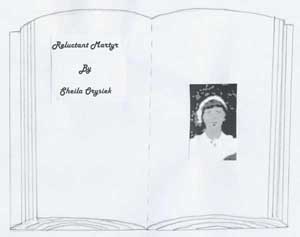 Editor's Note: This is the twelfth chapter in our serialization of Reluctant Martyr, a historical novel by our columnist Sheila Orysiek. It is based on the experiences of her aunt. In each Friday-Saturday edition of San Diego Jewish World, we will run another installment of the 21-chapter book until its conclusion. We thank Sheila for granting us first publication rights to her book. Comments to the author are welcome at orysieks@sandiegojewishworld.com Editor's Note: This is the twelfth chapter in our serialization of Reluctant Martyr, a historical novel by our columnist Sheila Orysiek. It is based on the experiences of her aunt. In each Friday-Saturday edition of San Diego Jewish World, we will run another installment of the 21-chapter book until its conclusion. We thank Sheila for granting us first publication rights to her book. Comments to the author are welcome at orysieks@sandiegojewishworld.com
Chapters 1 2 3 4 5 6 7 8 9 10 11 12 13 14 15 16 17 18 19 20 21
Reluctant Martyr—Chapter Twelve
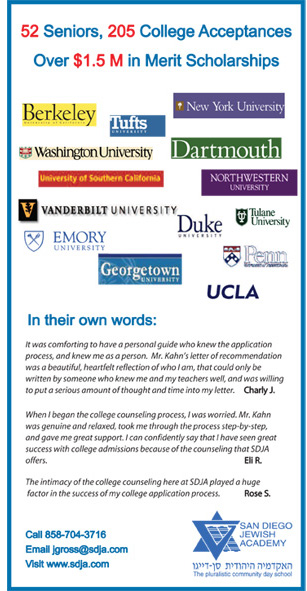 It was a fine fall day. A fast moving rain shower had passed and the air was filled with that peculiar city smell of rain and pavement and wet leaves. The sun had again come out and the light was golden with a reflected haze. A fresh breeze rustled the few remaining leaves on the trees. It was a fine fall day. A fast moving rain shower had passed and the air was filled with that peculiar city smell of rain and pavement and wet leaves. The sun had again come out and the light was golden with a reflected haze. A fresh breeze rustled the few remaining leaves on the trees.
Feeling greatly relieved from the recent financial pressure, Hannah and Jahn left the house and walked the short distance to the foot of 40th Street at Girard Avenue. They both felt hopeful about the future and much renewed. They boarded a trolley going to Market Street and then transferred to the elevated trains. The train tore along, the elevated tracks seemingly only a few feet from the second story windows of the houses and stores along its route.
Sometimes there were glimpses of the residents going about the varied activities of their daily lives in full view of the train’s passengers. They had apparently become immune to the tremendous racket of frequently passing trains; it was a cityscape panorama in motion. Hannah loved to watch it all and sat with her nose close to the window.
Soon they reached the 8th Street station and timing their movements with the train’s forward lurch made their way to the door. Jahn walked ahead to make headway through the people, Hannah close behind. They ran up the steps leading to the street above and were glad to be out in the breezy sunshine. The first stop was the automat for lunch, always a favorite place. Then, on to Leary’s Book Shop which was reputed to be the largest store of its kind in the world and there was no reason to doubt the claim.
 A true book lover’s pulse quickened upon entering; it was a seemingly endless maze of books. Floor after floor, shelf upon shelf, from floor to ceiling, two and three deep on each shelf, books waiting to be explored. There were stacks of books in the corners, on tables, on carts, even in the rickety elevator. To Hannah and Jahn, but especially to Jahn, it was an earthly paradise. They spent several hours, Jahn climbing the ladders to reach the highest shelves, or sitting on the floor exploring the lowest ones. After a while Hannah grew tired and found a stool to sit upon. She moved it by a dusty window and enjoyed the shaft of sunshine as she read a book she had arbitrarily pulled off a shelf. Jahn’s pile of books that he wished to buy grew quite large. He looked it over and then carefully selected just one. Hannah was pained when he put all the others back. A true book lover’s pulse quickened upon entering; it was a seemingly endless maze of books. Floor after floor, shelf upon shelf, from floor to ceiling, two and three deep on each shelf, books waiting to be explored. There were stacks of books in the corners, on tables, on carts, even in the rickety elevator. To Hannah and Jahn, but especially to Jahn, it was an earthly paradise. They spent several hours, Jahn climbing the ladders to reach the highest shelves, or sitting on the floor exploring the lowest ones. After a while Hannah grew tired and found a stool to sit upon. She moved it by a dusty window and enjoyed the shaft of sunshine as she read a book she had arbitrarily pulled off a shelf. Jahn’s pile of books that he wished to buy grew quite large. He looked it over and then carefully selected just one. Hannah was pained when he put all the others back.
“Why, Jahn, why put them back? Buy them all!”
“It’s just too much money; we still have to be careful.”
“Let me see which one you picked.” She opened the old cloth cover and was not surprised to find it a poetry book, Best Loved Poems of the English Language. “I wish you would buy the others,” she said. When they got to the register and he gave his book to the clerk Hannah quickly added the others to it. But before the clerk could ring it up, Jahn shook his head.
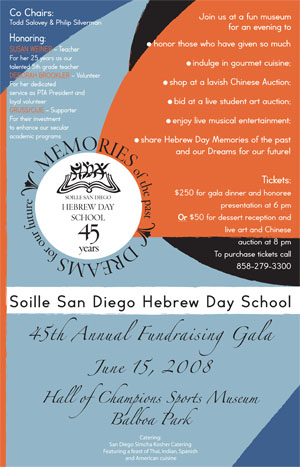 “No, Hannah, we must be careful. This one is enough,” but his eyes and quiet smile told her that he loved her gesture. “No, Hannah, we must be careful. This one is enough,” but his eyes and quiet smile told her that he loved her gesture.
They walked a bit more around the downtown area, Jahn with his treasure securely under his arm, until it was time to start home. As they were on the 40th Street trolley, the final leg of the trip, dusk was falling. They sat side by side, their eyes met and Hannah smiled. She still loved the hazel eyes behind the wire spectacles. He took her hand in his. She was embarrassed by so public a gesture, but he obstinately would not let go. In spite of herself she looked at him and laughed quietly with joy. It was the last happy outing they ever had.
..................................................
Hannah and her mother set out a few days later to keep the appointment with Dr. Rockman. It was a beautiful Indian summer day and everyone seemed to be out enjoying it before winter closed in on the city. To the last moment Sharona tried to dissuade Hannah of the necessity for keeping this appointment. “Nothing hurts me now. I tell you nothing!” she explained several times.
“Mother,” Hannah sighed with some impatience, “appointments can’t be made exactly when it hurts.”
“I think it was the terrible heat. Last summer it was so hot. You know how I hate that!”
“Your arm hurts too. How could the heat made your arm hurt? You’re being foolish.”
“This is a waste of money. I’m sure he’ll cheat us.” Sharona continued to mutter under her breath as they walked along.
Dr. Rockman’s office was on Parkside Avenue on the first floor of an apartment building facing the park and only a few doors down from the ice cream parlor. He was the personification, the very image, of a family doctor. In late afternoons he could be seen walking along the streets, black medical bag in hand, visiting the homes of seriously ill patients. It was $2.00 for an office visit, $3.00 for a home visit, but for many of his patients he charged a lot less.
His office was small and the waiting room was even smaller with just a few leather chairs and some tattered outdated magazines. A nurse, all in white from her cap to her shoes, tended to the paperwork details and aided the doctor in some medical procedures. On the wall were proudly displayed all of his diplomas and degrees, as if to reassure those who sat waiting. Sharona needed reassurance. On this particular day she felt well and continued to argue with Hannah as to the advisability of keeping this appointment, but Hannah took her by the arm and insisted.
They went in the door and took their seats. It was nearing lunch time and except for a young mother and her squalling child, the office was empty. The nurse soon called Sharona and both mother and daughter got up. The nurse, however, stopped Hannah.
“Are you the patient?” she asked.
“No, my mother is, but...”
“The doctor will see her first I’m sure. Perhaps later he’ll call you in.”
Hannah watched her mother and the nurse disappear behind a door. The waiting seemed long and the child’s restless crying made it worse. Happily after a while a man looked in the front door and the mother and baby left with him. The nurse came back, opened the office door, and nodded for Hannah to follow. She found herself seated next to Sharona and facing a heavy set man behind a large desk. He said hello, shook hands, and then informed her of the results of the examination.
“Your mother tells me she feels fine. In fact according to her there is nothing wrong!”
“Today,” Hannah said emphasizing the word, “she feels fine today. But on other days she complains of pain.”
“Well,” he continued, “I have examined her, and did finally learn that her left arm hurts, and she has trouble catching her breath.”
“And stomach aches,” Hannah interjected.
He continued, “...and her stomach aches, and so I feel she should see another doctor, a heart specialist.” Both women were aghast. A specialist! It sounded very serious!
“Now,” the doctor went on, “don’t be upset, I just want to be sure. I’ve listened to her heart, but I think a specialist should see her too.” He wrote out the name of another doctor. They thanked him profusely, respectfully, and left. As they walked home arm in arm, they were all atremble. A specialist! A heart doctor! Then Sharona suddenly stopped, looked around at the beautiful sunshiny day and said, “This is silly. I won’t do it. I feel fine.” Hannah couldn’t change her mind; her mother’s decision was firm. Enough of doctors, she wouldn’t go.
.........................................................
State Street was not a quiet place but a clamor of city noise. Early in the morning, before dawn as an overture came the clip clop of horse’s hooves on the pavement as the milk wagon made deliveries to the houses. Next came the bread wagon and then the ice man’s horse and wagon. Later in the day the street peddlers walked, each crying a particular sing-song. One bought old clothes and another was trying to sell them. One bought rags, another, newspapers. There were snow cone carts, ice cream carts, pretzels and hot dog vendors, especially in the summer. Heavy coal trucks rumbled through the narrow streets, but that was a winter sound. Craftsmen sold their wares or a grinder on wheels sharpened scissors and knives of the householders by the curbside.
The noisiest part of the clamor was the day the refuse trucks came. Trash was put out in front of each house in tall cans, garbage in small covered buckets and ashes from the coal furnaces in tin tubs. The city sent a large open dump truck and while one man threw the tall cans up over the side of the truck another stood in the truck bed amidst the trash, emptied it and then threw it back down. It was back breaking work. A smaller truck did the same with the garbage, the man who stood in that truck wore tall boots. The only time the street quieted down was for winter holidays.
That year Uncle Joseph decided to give his workers, and himself, four days off over Thanksgiving. It was the first paid holiday Jahn had ever had. He thought it would be nice to take a trip.
“Why don’t we go away for a few days?” He said as he and Hannah walked along Girard Avenue on their way home from seeing a movie.
“Go away? Jahn, what are you....?”
“I mean just a couple of days. We’ve never been on a vacation or anything. Some people go all the time.”
“But it’s expensive.”
“If we go for a couple of days, like to Atlantic City...”
Hannah gasped at this suggestion. “That is a lot of money!”
“Maybe not in the winter. I think the prices are cheaper in the winter. We could get a room somewhere.”
“I guess the four of us could share.”
This was not what Jahn had in mind. “Well, Hannah, I was thinking just you and I could...”
Not listening, Hannah added, “My mother might like that. Etah would have to come too. What do you think?”
Jahn quickly gave up any idea of leaving the others behind. “Of course, of course, I’m sure everyone would like it.”
“I’ll write for the prices. Aunt Nora probably knows somewhere to stay.”
“Just use the telephone, Hannah,” he told her.
Atlantic City was sixty miles away, a two and a half hour trip by bus. The best time to go was in the summer, however, in the fall or winter the prices were lower, but most of all it was an outing for them. Since coming through New York after landing in the United States, they had never been further than the environs of Philadelphia. So Hannah made reservations at a boarding house in Atlantic City using the telephone, as Jahn had suggested, for the first long distance phone call ever made from that house, and that too, was fun. Even at the winter rates an ocean view room was far too expensive so they settled on one with a view of the city. Hannah was also assured the room would have sleeping arrangements for four adults.
Thanksgiving Day was cold but bright, and they left the house early hoping to be in Atlantic City in time for supper. They went downtown to catch the bus; Jahn carried two heavy suitcases and Etah dragged a third. Who would have thought, Hannah wondered to herself, that we would be going on a vacation? It was only for three nights, but a vacation nonetheless.
The bus went through center city Philadelphia and over the bridge crossing the Delaware River to New Jersey. It went past small towns and miles of winter-bare trees, traveling at tremendous speed, or so it seemed. The bus made a short stop to allow the passengers some time off and they walked about and saw farms that in summer swept green to the horizon. Miles and miles of salt marsh surrounded the road until finally Atlantic City could be seen in the distance. After getting off the bus they walked carrying the suitcases to the boarding house; it was a lot farther than it had appeared on the map.
The boarding house was old and very much like those seen all through the city. Wooden steps led up to the large front porch, a small lobby area was crammed with heavy, used furniture and every available space in the house was made into a room for rent. Jahn signed the register and paid the bill in advance and then began the struggle with the suitcases up three flights of stairs. Hannah was incensed. “Couldn’t we get a room closer? Not up so many steps?”
“The desk man said this is all they have,” Jahn replied as the suitcase knocked along the stair rail.
Finally they were at the door and Jahn turned the key and entered. The light switch didn’t work but from the hall he could dimly make out a lamp, so he reached for that. They couldn’t help but feel disappointed; the room was tiny and dingy. There was a dresser with three drawers which when opened hung at an angle. Two chairs stood by the window. One double bed and two cots completed the furnishings. The view of the city was actually another rooftop, but the window was so spattered with dirt, even that was a blur. The bathroom was down the hall.
“If we hurry and get changed we can get to the hotel Aunt Nora told us about for dinner,” Jahn said, reminding the others that they had planned on having their Thanksgiving meal at the world renowned Breaker’s Hotel. They had heard so much about it over the years. People bragged about having stayed there, and said it was “the” place to go. Changing their clothes was managed by letting Jahn change first while the three women stood out in the hall. He then went downstairs while they changed. When everyone was ready they walked to the hotel, the famous Breakers Hotel, only a few short blocks away. The thought of having a glimpse of people who probably vacationed regularly was exciting and just for a brief time; they would be part of it!
And there it was, all alight, a uniformed bellhop at the front door, almost inviting them in. The lobby was huge, with deep chairs and comfortable sofas everywhere. With writing tables, lamps and carpets, the place radiated comfort and prestige; a very different lifestyle than they were used to. It took a while to locate the dining room, and it, too, was huge. The tinkling of silver and glassware could be heard along with the hum of happy conversation. Uniformed waiters hurried by with big round trays carried high over their heads. The entry to the dining room was guarded by a maitre’d with a large red cummerbund around his waist. He greeted them with a smile.
“There are four of us,” Jahn told him.
“What is your last name, please?”
Jahn looked surprised at the question. “My last name is Perris.”
“What time are your reservations for, sir?”
“What?”
“Your reservations, sir? What time are you down for?”
“We have just come for supper.”
“I know, sir. But this is Thanksgiving and we are all filled up. Didn’t you call and make reservations?”
Hannah came over. “We are here from Philadelphia.”
“I’m very sorry, however, for Thanksgiving you need to call ahead.”
“What can we do?” Hannah asked, but the maitre’d had already turned to escort another group of people into the dining room.
The sun had set and the night air was cold as they went back through the wonderful front doors and down the steps to the sidewalk. Not only was this a disappointment but they were really hungry now. The walk back to the boarding house seemed much longer.
“There must be some place we can eat,” Jahn said as he looked up and down the street. “Probably all the restaurants are the same problem.”
Sharona was shivering even through her heavy coat. “My mother is cold,” Hannah said. “Let’s go back,” and she put her arm around Sharona’s shoulders.
“I saw a sandwich place across from where we’re staying,” Etah suggested. “We could buy some and eat in our room.”
“Etah!” Hannah’s voice was sharp, “we’re not allowed to take food upstairs.”
“But that’s a good idea!” Jahn exclaimed. “You go on up and I’ll buy the sandwiches and hide them under my coat.” It was a dreary way to start a vacation.
The next day they planned to go to the boardwalk. The world famous boardwalk of Atlantic City stretched for a great distance between the beach and the city streets, and made a wide and magnificent promenade. The beach itself was spectacular; broad with finely grained white sand, it had beckoned vacationers for decades. Along the boardwalk, facing the ocean, were hundreds of stores and hotels. There were shops of all descriptions from fine china, crystal, linens and oriental rugs, to curios and souvenirs. Huge hotels with sumptuous dining rooms to hot dog stands and cotton candy; it was a world unto itself. That night they all went to bed happily looking forward to seeing and exploring this famous landmark. Since Hannah claimed great embarrassment at sleeping next to Jahn in the presence of others, even close family, Jahn slept on one cot, Etah on the other and Hannah and Sharona shared the double bed.
Early in the morning, while still dark, it began to rain. It continued to rain all day, without stop. Walking on the boardwalk or going anywhere at all was out of the question. Breakfast, lunch and dinner were divided between a coffee shop down the street and the sandwich place across the way. Jahn had stuck a book in his suitcase, but the one lamp in the room was much too dim for reading. So the four of them sat all day in that tiny room and watched the rain through the spattered window.
Saturday dawned sunny and clear, the rain had fled with the night. Everyone dressed, using the same procedure as before and they talked happily over breakfast. At last the vacation would really begin. The boardwalk was only three blocks or so from the place they were staying and it was with great anticipation that they walked to it. A ramp led up from the street, up to the seemingly endless boardwalk, as it reached in both directions as far as the eye could see. Once close to the ocean, however, there was a whipping wind and though the sun was out, it was quite cold. This was unexpected and so, while the women waited in the shelter of a storefront, Jahn went back to the room for additional sweaters and coats. When he came back and they had walked a short distance it was time for lunch. The grand dining rooms of the big hotels were much too extravagant for lunch and perhaps also, an American meal of kosher hot dogs would be more fun. Hannah and Sharona sat on one of the benches that lined the boardwalk while Etah and Jahn bought hot dogs with mustard, pickles, French fries and milkshakes. It wasn’t easy to balance all this stuff while sitting on the bench and wearing cumbersome winter coats, with gloves and kerchiefs making it much more difficult, too. The chill wind numbed their fingers a bit, but they laughed at the dripping mustard and gulped down the food.
“Maybe I should have gotten some hot tea,” Sharona said as she eyed the cold milkshake.
“That’s all there is mother,” Etah replied between bites. “Besides, you once told Hannah that in America we should do as Americans do. And, I’ve never seen anyone drink tea with hot dogs,” she laughed.
After lunch Sharona wanted to sit a while and of course Hannah insisted on staying with her. “Jahn, take Etah and go. You might as well walk around a bit.”
So Jahn and Etah headed off down the boardwalk. They passed the Planter’s peanut store, filled with peanuts and more peanuts. A large statue of Mr. Peanut stood outside and the delicious warm aroma of roasting nuts wafted out the open door. At another place they paused to watch a huge machine endlessly pull and twist the salt water taffy. Jahn went in that shop and bought a small box. “You can’t go to Atlantic City and not buy salt water taffy!” he explained.
There were penny arcades, prizes to be won with a lucky shot or a ring toss, mirrors that reflected back strange shapes and a newspaper press that could print anything desired. Some shops sold souvenirs and curios of every kind and others only seashells. It was a wondrous collection of things to see and do and buy. Several piers jutted out over the ocean and there, too, were more rides, arcades, shops and movie theaters. On one pier they walked all the way to the end and looked down and saw the ocean washing in below. On the same pier were a carousel, a miniature roller coaster and a Ferris wheel.
Jahn daringly bought tickets for the Ferris wheel and Etah could hardly wait! They got in the seat and slowly rotated upward. What a wonderful sensation! The shops were very far below and the people looked so small. Etah held tightly to Jahn’s arm, but she was marvelously excited! The ride was too soon over as far as she was concerned.
On the way back they bought hot waffles with a slice of ice cream in the middle and they raced to eat it before the waffles melted the ice cream. It was extraordinarily good. Reluctantly, they turned back and as Jahn and Etah approached, Hannah looked up anxiously at them. Sharona was pale and trembling, she was obviously not well. “Jahn, she’s very ill.” Hannah was almost in tears. “We have to get her out of this wind. Some place warm. Let’s go back to the room so she can lie down.”
Hannah put her arm around her mother’s shoulders and with Etah on the other side they walked as quickly as possible. Sharona had to move slowly, however, and as cold as it was, her brow was wet. It seemed an eternity before they reached the boarding house and it became immediately evident that Sharona could not climb three flights of stairs.
“I want to go home,” she murmured.
Jahn looked at her and said, “Maybe a doctor here...”
“No, no strange doctor.” Sharona was sure of that.
“I think we have to get her home,” Hannah’s voice was thick with worry. “Etah, you stay here. Jahn, come let’s go up and pack.”
So, while Etah sat in the drab lobby with her mother, Hannah and Jahn quickly climbed the stairs and stuffed everything in the suitcases. Jahn had to call a cab, as Sharona could not walk to the bus station. Once there they were lucky to be able to change their tickets, but the next bus did not leave for Philadelphia until 8 p.m. They had several hours to wait.
It was close to midnight when they finally arrived home. Hannah helped her mother up the steps to the bedroom. Jahn dropped the suitcases and ran down to the cellar to start a fire in the coal furnace, the house was ice cold. Etah lit the gas stove in the kitchen to heat water for her mother’s tea. That night Hannah sat by Sharona’s bedside holding her hand. Etah slept on the sofa and Jahn slept alone. Since the next day was Sunday, Hannah had to wait until Monday morning before she could make an appointment with the heart specialist.
..............................................
Dr. Werner’s office was downtown on Pine Street and several days later Hannah brought her mother there. The street was made up of what were once very beautiful old brownstone houses that over the years had been converted to professional offices of all kinds. Many were three or more stories high with floor to ceiling windows, lovely parquet floors and white marble steps in front of impressive doorways. Dr. Werner owned two of these buildings side by side and he had combined them by connecting interior doorways. It was not just an office, or even a clinic, but a private hospital with separate wards for men and women as well as private rooms and special nursing care.
Hannah and Sharona arrived in the morning and approached this appointment with a great deal of trepidation. It was like crossing threshold, one of doctors, and medicine, and probing and uncertainty. They dreaded the possibility of hearing bad news, and yes, also the expense. It was an unexpected intrusion, an interruption of their daily lives. The place smelled of foreboding.
The receptionist’s forced smile and the patient information sheet she wanted filled out seemed like the first step down a foggy road. It was a struggle to understand the questionnaire. They sat on a hard leather sofa and both heads were bent over the task of filling it out as well as possible. Then the waiting began. The large lobby was very crowded and every seat was taken. It was almost lunch time when finally Sharona was led down the hall by a nurse and Hannah resumed her anxious wait alone.
She was not hungry for lunch. The office staff ate their sandwiches, talking and laughing. The waiting room seats emptied and then filled again. Hannah couldn’t read or really do anything; she was so filled with anxiety. The afternoon wore on, the lobby grew emptier and the office staff went home, and Hannah was still sitting there. Then at long last a nurse came by and took her down the same hall to Dr. Werner’s office.
Everything about it was imposing; the dark paneling, the mahogany desk and the austere man that sat behind it. He let her wait several minutes before he looked up. “Mrs. Perris,” he began, without any preliminary greeting, “I believe your mother has suffered a series of minor heart attacks.” Suddenly there it was, hanging in the air, the words she most dreaded to hear. Her lip began to tremble; her fingers gripped her purse, the knuckles turning white.
He continued on, looking down again, not at all interested in the impact of his words. “Here is a prescription for some medication for pain. She’s to put a drop on her tongue when she feels she needs it. Also, she has some elevated blood pressure so I want her to cut out salt and other spices. Also egg yolks. You must see to it that she does not unduly exert herself. I’ll need to see her every other week. You can call the office for an appointment. Do you have any questions?” He never looked up at all.
“Where is my mother now?” Hannah’s voice was tremulous with fear.
“She’s dressing and you can wait for her here.” He then stood up and left.
When they got home it was well after dark. Etah had made some supper and she and Jahn had already eaten. Sharona at first refused to eat until Hannah threatened to do likewise and so in the end both ate a little. Then Sharona went upstairs. Hannah told Etah and Jahn about the examination and what the doctor had said. She spread her hands on the table, her sense of gloom deepened as she spoke. “He doesn’t want her to exert herself. Etah you will have to do more housework after school.” Then she turned to Jahn and said, “Can you run over to the drug store and get this prescription? Maybe he’s still open.”
Jahn took it and left. Etah cleared the table and Hannah went upstairs to look in on her mother. She heard Jahn come back a while later and then the piano softly being played. Suddenly something snapped in Hannah. All the fear and frustration exploded and she ran down the stairs and into the back room. “How can you play? How can you? My mother is dying! And you’re playing the piano!” She was livid, she was shaking with emotion. Jahn had never seen her so upset.
“Hannah,” he caught her hands and held them, “she’s ill, but the doctor didn’t say she was dying. She needs to be careful. I thought she might want to hear some music, I know she likes it.”
But Hannah was in tears and hardly heard him, as she ran back to Sharona’s room. She felt panic at the thought of losing her mother. This mother whom she had left behind when she went to America had assumed the stature of an angel in her mind. The image had only grown with the separation and had not changed when they were at last reunited. If anything if had become enlarged, and now when she had her mother once more, safe in her home, this insidious illness might deprive her again. And, against this evil she felt defenseless.

ADVENTURES IN SAN DIEGO JEWISH HISTORY
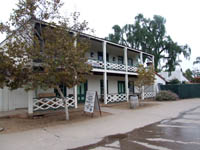
Robinson-Rose House
|
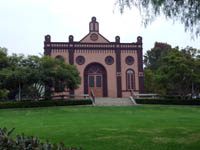
Old Temple Beth Israel |
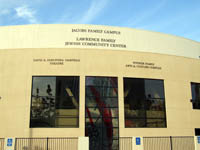
Lawrence Family JCC |
Editor's Note: We are reprinting news articles that appeared in back issues of various San Diego Jewish newspapers. You may access an index of the headlines of those articles by clicking here. You may also use the Google search program on our home page or on the headline index page to search for keywords or names.
400 Attend Youth Rally
From Southwestern Jewish Press, March 13, 1947, page 7
{Editor’s Note: this supplements and varies with another report in same edition of the Southwestern Jewish Press:)
Another link in the chain of major activities planned for this year by the Lasker Lodge of B’nai B’rith was forged Monday evening, March 10th, when about 200 young people and approximately 250 adults attended a huge Youth Rally held in Temple Center. In attendance from Los Angeles were Aaron Gordon, on the Executive Committee of District Grand Lodge No. 4; Harry Brager, National Membership Chairman of B’nai B’rith and Hy Haves, Western Regional Director of A.Z.A.
In their addresses to the audience, both Mr. Hayes and Mr. Brager, though young in years, but rich in experience in the problems of Jewish Youth, stressed the need for organization by youth to carry forward the program of Democracy and Brotherhood. The speakers well-chosen remarks and down-to-earth anecdotes were enjoyed by all present. The Youth present accepted the challenge to build for themselves again the active group so important to the rounding out of a Jewish community.
“It was very gratifying to receive the co-operation and support of the Youth of San Diego at our Rally,” said Morrie Douglas, president of Lasker Lodge. He added, “We believe that their program, if followed after the pattern set by National Headquarters will certainly provide qualified leaders for the future.”
Hadassah
From Southwestern Jewish Press, March 13, 1947, page 8
Hadassah wants its many friends who are making Premier Night at the State Theatre on March 17th an assured success to know that proceeds for the event will go to the Rothschild Hadassah University Hospital on Mt. Scopus outside Jerusalem.
The local chapter is endeavoring to raise more than their quota of $1500, which is part of a nation-wide goal of $1,500,000 sought by Hadassah to carry on its ramified medical program in the fields of hospitalization, public health, sanitation, occupational therapy, pre-natal and post-natal care.
Begun in 1912, with a modest program of child welfare work in Jerusalem, Hadassah now supports and administers a country-wide network of services and institutions throughout the Holy Land.
Hadassah has become the “Health Arm” of the Jewish Agency.
$350,000 Campaign to Open Wed. March 26
From Southwestern Jewish Press, March 20, 1947, pages 1,8
San Diego’s unprecedented campaign for $350,000 for refugees, overseas needs and Palestine will be opened at the campaign dinner on Wednesday, March 26, 6:30 p.m., at the Continental Room of the San Diego Hotel, with Dr. Joseph J. Schwartz, who has just returned from Europe as the principal speaker.
Dr. Schwartz, who with Earl G. Harrison, American member of the intergovernmental committee on refugees, brought to the attention of the American people the subliving conditions existing in displaced persons’ camps, will tell the story of Jews in Europe, as he has seen it for many years. He has served the Joint Distribution Committee since 1939 and is considered the leading authority on the condition of Europe’s 1,500,000 survivors.
The 1947 campaign is under the leadership of Max Rabinowitz and Louis Steinman as general chairmen with Nathan F. Baranov as honorary chairman. Mrs. Julia Neumann and Mrs. Bernice Soule will lead the women’s division in their drive for the goal of $35,000. The first young people’s division organized in San Diego will be led by Renee Perlmutter and Sallie Stone. The young people with the able assistance of Joan Jacobson, Stanford Brust, Ben Siegel, Yale Naliboff, Hadara Domnitz and Jeanette Toblas have assumed a goal of $3,500.
Elliott Cushman will head the publicity committee, Morrie Douglas and Larry Cantor the automobile industry, and Dr. Robert M. Stone the professional division. Other leaders will be announced in the near future.
An Open Letter to the San Diego Jewish Community
From Southwestern Jewish Press, March 20, 1947, page 1
By Eli Levenson
President of United Jewish Fund
It is with a deep sense of humility and gratitude and a deep appreciation of the responsibilities which devolve upon me in having been honored with the presidency of the United Jewish Fund of San Diego.
We in San Diego are suffering with the pangs of the birth of a real Jewish community. 1947 may well fix the pattern for Jewish Community life not only for ourselves but for our children. It is for each of us to assume our responsibility in this new pattern and do our individual part in its molding.
As an isolated Community that has experienced rapid growth during the war period, it has been impossible to do those things so necessary for ourselves, our children, our community and our fellow Jews elsewhere.
As the individual has adjusted himself and as industry has returned its normal activity so much we as a community not only adjust, but readjust, to changing conditions. We can achieve this goal in 1947 through broader and more democratic participation in the work of the United Jewish Fund which is recognized as the overall Jewish Agency in our community. Through it we can shoulder our share of furnishing aid to alleviate distress of fellow Jews throughout the world. Through it we can build for ourselves and our children a representative Community Center; through it we can coordinate the activities of our so essential welfare agencies; through it we can maintain and continue the excellent relationship heretofore established with our fellow men. Through it we can not only build our Jewish Community but do our part in the Civic Life of Sn Diego.
It is the desire of your officers and board of directors and my personal wish that you consider the United Jewish Fund and its staff always at your service. The necessity to plead for cooperation is gone—We know that you will cooperate.
{Return to top}

Nancy Harrison
cruise & tour specialist
(619) 265-0808



SAN DIEGO JEWISH WORLD THE WEEK IN REVIEW
Middle East
Constraints on Israel deciding to retaliate in Gaza range from the legal to the strategic by Eran Lerman in Jerusalem
Has Israel forgotten defensive principles of short wars on other countries' territories? by Shoshana Bryen in Washington, D.C.
San Diego
Not everyone loves big-hearted volunteers by Sheila Orysiek in San Diego
Stories from SDJA Student Quarterly:
—Mind over matter: The Alesha Thomas story by Alexa Katz
—Maestro and the Diva at JCC by Charly Jaffe
—SDJA role in Afula concert by Eitan Frysh
Adventures in San Diego Jewish History
March 13, 1947: Jewish Labor Committee
March 13, 1947:Young Actors Win Laurels in Play
March 13, 1947:Drama, Prizes and Noisemakers at Party
March 13, 1947:Temple Beth Israel Purim Play-Party
The Arts
Redundant to say, The Hit is a hit by Carol Davis in Coronado, California
Thursdays With The Songs of Hal Wingard:
—#9, Getting Rich
—#26, Gypsy
—#33 You've Taken What I Had
San Diego
Stories from SDJA Student Quarterly:
—Passover in Promised Land by Gaby Maio
—Poway hate crime by Andrew Retzer
—Teens hone leadership skills at Jenna Druck confab by Alexa Katz
San Diego Jewish Trivia: Performers by Evelyn Kooperman
Adventures in San Diego Jewish History
—March 13, 1947: J.W.V. Aux President To Visit San Diego
—March 13, 1947: Zionist Group Plans Dinner
—March 13, 1947:450 Attend BB Youth Rally
The Arts
Shel Silverstein play: A cavalcade of crazies; play review by Cynthia Citron
Grief may lead to personal transformation; book review by Donald H. Harrison in San Diego
Middle East
Middle East theme song: Send in the Clowns? by Ira Sharkansky in Jerusalem
It's SRO for Shavuot in Old Jerusalem by Judy Lash Balint in Jerusalem
How kibbutz celebrates agricultural holiday by Ulla Hadar in Kibbutz Ruhama. Israel
San Diego
Block's win and long-range Nunez plans by Gary Rotto in San Diego
SDJA juniors scout prospective colleges by Brenna Decker, Michele Goldfarb-Shapiro, Becky Rudin and Asher Wittenberg from up and down the U.S. West Coast
Smarter than a 5th grader? I'd have to work myself through 1st grade competion first by Donald H. Harrison in San Diego
Adventures in San Diego Jewish History
—March 13, 1947:Form Community Relations Advisory Committee Here
—March 13, 1947: Crum Demands 100,000 Enter Palestine—Print Mufti Papers
—March 13, 1947: S.O.S. Passover Needs in Europe
Arts & Leisure
The emperor is even worse than naked by Sheila Orysiek in San Diego
Frieda's big surprise at Frida's Restaurant by Donald H. Harrison in Chula Vista, California
Play tackles nature of American Judaism by Cynthia Citron in Los Angeles
San Diego County
Three articles from SDJA Student Quarterly, a student publication of San Diego Jewish Academy:
—Across the Editor's Desk by Alexa Katz
—SDJA 'Spring Fling' went under water by Michelle Rizzi
—Fellowship to Jack deTar by Gaby Maio
Adventures in San Diego Jewish HistoryMiddle East
Hamas acknowledges its responsibility for rocket attacks that killed 26 Israelis by Ira Sharkansky in Jerusalem
To the Israeli government: Do something! by Yankele Cohen in Kibbutz Nahal Oz, Israel
Judaism
Continual study: too much of a good thing? by Rabbi Leonard Rosenthal in San Diego
Trusting in Hashem at Bear Stearns by Robert Savit via Rabbi Baruch Lederman in San Diego
San Diego County
Green collective for Jewish institutions? by Marissa Palin in San Diego
Three articles from SDJA Student Quarterly, a student publication of San Diego Jewish Academy:
—Seniors leave big shoes for juniors to fill by Gaby Maio
—Pickets target SDJA by Eitan Frysh
—New programs in SDJA ASBC by Shiri Bogomolny
Arts & Leisure
The Schwartzes within The Brady Bunch by Cynthia Citron in Hollywood, California
Sports theme at San Diego County Fair by Donald H. Harrison in Del Mar, California
Adventures in San Diego Jewish History
—March 6, 1947: Western States Meet; Here This Weekend
—March 6, 1947: Beth Jacob to Have New Rabbi
—March 27, 1947: Wins Akiba Award
Link to previous editions
< BACK TO TOP
|
